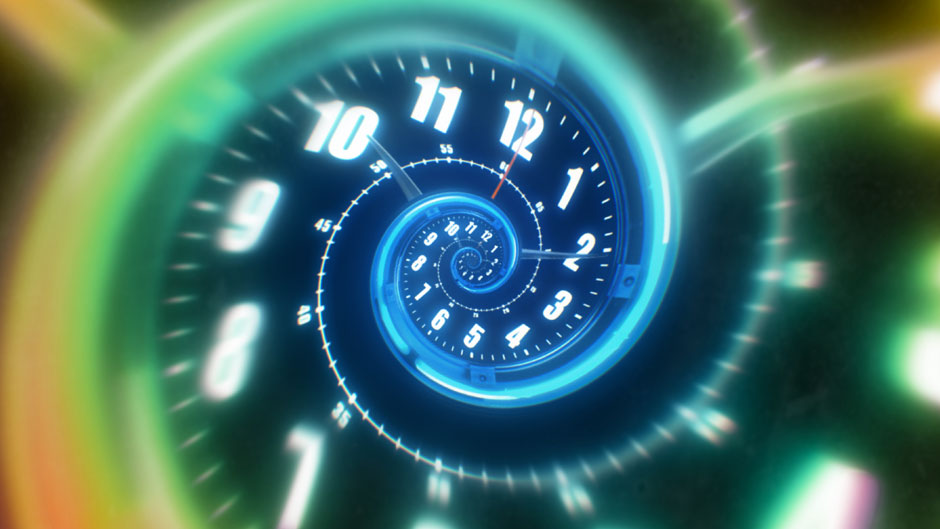Six hundred thirty-seven days have transpired since the first University of Miami Health Advisory alerting the community of intentions to monitor the development of the “Novel Coronavirus (2019-nCoV)” was sent on Jan. 27, 2020, a day after confirmed infections were detected in four U.S. states.
The perception of time passage for those 637 days has been profoundly varied and disorienting for many people fortunate enough to have survived the period. Did someone widen the throat of the hourglass so that the grains of sand slipped through in a rush? Or has some hamster lodged their furry belly against the clock’s gear train and so slowed the passing wheel of time?
“Our sense of time is impacted by the level and amount of newness we experience,” explained Aaron Heller, an associate professor in the College of Arts and Sciences Department of Psychology. “Our daily routines during the pandemic have been drastically reduced. The level of exploration we are used to—visiting new places, trying new restaurants, trying to make new friends, going to a bar—all those things have been restricted in significant ways.”
Heller, who researches the bio-behavioral mechanisms that give rise to the development of depression and anxiety, noted that while the lack of social interaction and reduction in diversity in daily experience has left many of us in “a huge vanilla routine,” those with preexisting anxiety or depression or who were at risk for these conditions have been most sorely affected.
Berit “Brit” Brogaard, a professor of philosophy, Cooper Fellow, and director of the Brogaard Lab for Multisensory Research, highlighted that stress factors—which the pandemic has spurred in spades—create time illusion.
“Stressing the body, either physically or psychologically, has been shown to subjectively extend time,” she pointed out. Positive stresses—referred to as “arousal” in philosophy yet in lay terms “excitement”—can also dilute time, a sense of prolonged time.
Both fearful and exciting experiences, such as the adrenaline pumping that comes with readying to ride a roller coaster, can cue neurotransmitters that shift our experience and ultimately perception of time. And an experience such as a much-anticipated summer vacation can remind us that subjective time both expands and contracts. The first few days on break may seem like weeks, while the last few days seem to fly by.
Brogaard credited American philosopher William James and French philosopher Henri Bergson with the fact that today we recognize both objective and subjective time.
Bergson advanced the notion of “lived time” (la duree) and posed that our past feelings and memories influence our present experience. His research explained why for two experiences of exactly one hour (objective time)—sitting in a dentist’s office and enjoying a party—our subjective experience of that same one hour is markedly different.
James sought to parse space and time to its smallest increment and led to our understanding of the existence of the “specious present”—or the extended present moment, Brogaard pointed out.
“He’s saying that in order to perceive motion, our subjective present must be longer than the objective time frame. Once that is established, you can start to explain why it is that we experience time differently in different situations,” Brogaard explained.
While James and Bergson were at the forefront of this philosophical arena, long before the ancient Greeks recognized a contrast between Kronos, or quantitative and objective time, and Kairos, a qualitative sense of time.
Brogaard noted that the elderly and those who have been especially isolated tend to feel that time has been flying by. After a year or longer of not having seen a grandchild, they might be astonished at how much they’ve grown or changed owing to the time lapse.
Heller, whose field of affective neuroscience studies how neurons influence emotion, noted the importance of memory to our perception of time. Because during the pandemic we’ve had fewer new experiences and so fewer memories, there has been an increase in the phenomenon known as “prediction error” which impacts our sense of time.
For every memorable event or experience—maybe a new place we visited or a TV show we saw—there was a beginning, middle, and end, though we recall it as a singular moment in time, Heller explained. Yet something happened just before and just after, so there is a continuation that is marked by boundaries or segments of events.
What happens in these boundaries are surprising and unexpected things that we may not have predicted that in a sense jar the brain into a different state, he explained, adding that the brain depends on these boundaries and attempts to predict what will happen.
Research in this area generated a mathematical formula that contrasts the difference between what happens and what we think will happen. Neuroscience in the 1990s documented that monkeys got a huge boost of dopamine when they received juice they were expecting and registered a big dip when they didn’t—an indication of a prediction error.
These errors are critical for learning, adaption, and improving our ability to expect what will happen and are important for the memories that we have.
“In the pandemic we don’t have as many memorable experiences and so our brain’s ability to predict accurately is altered and prediction errors increase,” Heller said.
While the pandemic persists, certainly there are more opportunities to resume some degree of normalcy and re-sync our objective and subjective clocks. What suggestions does Heller offer?
“Boosting our emotional well-being seems to be impacted by these exploratory behaviors, so the most direct and basic recommendation is to get out and do different things that aren’t part of your routine, obviously being safe within Centers for Disease Control and University guidelines,” Heller said.

